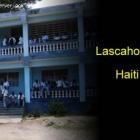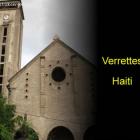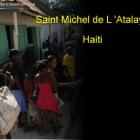ADVERTISEMENT
RE: Haiti too Rich to be Poor, Mole Saint-Nicolas Development Plan
O...
yes! Most Haitians are very poor, but Haiti is not poor at all.
Development is possible in Haiti, but the authorities, both Central Government and local government, must realize and understand that. They are the once who could facilitate or stop the development.
The administrators of the country must govern for the well being of the people, of all of the Haitian people.
Haiti was the first country to defeat slavery, and it can be, perhaps, the first country to introduce a Real Sustainable, Integral and Participating Socioeconomic Development Plan with the Practice of Fair-Trade.
It can begin in one commune, and then spread all over the country.
For this, all the conditions are made.
Lots of people have presented drafts for strategic development in Haiti.
I am one of them. For many years, I have been trying to launch an agroindustrial project in Haiti, but so far, it has been almost impossible.
Nevertheless, I keep on trying.
On September 2006, I sent a representative to collect some data for an agroindustrial project around Plato Central.
On March 2007, I sent two representatives to start a negotiation with the Association of Mango Producers in Leogane.
On April 2010, I presented a proposal for the strategic development of Haiti, starting with several pilot plans in the Commune of Carrefour.
The proposal was approved by the City Council on May 4, 2010 (Mairie de Carrefour, No. / Réf. CM/CE-102), but the socio-political instability of Haiti at that time, among other things, delayed the launching of such an urgent and important project.
Last year, we put together a coalition of educational, government, private and civil entities, including: The Autonomous University of Santo Domingo (UASD), the State University of Haiti (UEH), the Agro-Forestry University of Jarabacoa (DR), three universities from Italy, several private enterprises, NGO entities from Haiti and DR, and we also included the City Halls of Carrefour, Gressier and Leogane.
We had identified a good source of funding to finance four pilot projects between Carrefour, Gressier and Leogane, and the same in the Dominican side. The founding was coming from the African, Caribbean and Asian Program of the European Union (ACP Program).
The dead line was February 7, 2013, at 4:00 PM. I went back to Carrefour at the end of January of this year to get this proposal approved by the Haitian parties involved.
The City Halls of Gressier and Leogane welcomed it, but the Authorities of Carrefour did not. We visited the City Hall of Carrefour five times, but the Mayor refused to accept our proposal because "it was approved by the former Authorities".
We tried many different approaches, but time went by and, by the time we decided to leave the City Hall of Carrefour out, it was too late. Haiti lost the opportunity that the European Union was offering to ACP countries.
That project proposal was not sent to the ACP Program.
It is still updated.
We will rewrite it and send it to other sources of funding, including USA, Europe, BRICS and other countries, as well as private investors.
Now, we are focusing our attention to other locations.
Soon, we will convey you information about our next moves.
Regards,
Nestor Mateo
Related Article:
Haiti too Rich to be Poor, Mole Saint-Nicolas Development Plan
This statement is so true. Haiti is really too rich to be poor, based on its geographic location and resources. I am going to take Mole...
Our objective is to share with you news and information about Haiti and the people of Haiti. Traditions, habits and the way we were or grew are alive in this site. We highly recommend that you Subscribe to our Newsletter and also share with us some of the things that are memorable and made us unique people.


 Lascahobas, Haiti
Lascahobas, Haiti  Life After Death
Life After Death  Verrettes, Haiti
Verrettes, Haiti  Haitians are a Proud People
Haitians are a Proud People  Saint Michel de L 'Atalaye
Saint Michel de L 'Atalaye